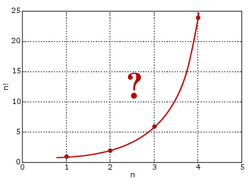Fact of Factorials
 Let
f
(
n
)
:
Z
+
→
Z
be a function which gives the number of trailing zeros in
n
!
.
Let
f
(
n
)
:
Z
+
→
Z
be a function which gives the number of trailing zeros in
n
!
.
Then find,
n → ∞ lim n f ( n )
Details and Assumptions
- For example, if n = 3 , then 3 ! = 6 , so f ( 3 ) = 0 ; if n = 7 , then 7 ! = 5 0 4 0 , so f ( 7 ) = 1
Image Credit: Wikimedia Factorial Interpolation
The answer is 0.25.
This section requires Javascript.
You are seeing this because something didn't load right. We suggest you, (a) try
refreshing the page, (b) enabling javascript if it is disabled on your browser and,
finally, (c)
loading the
non-javascript version of this page
. We're sorry about the hassle.
1 solution
Note that the terms should be in the floor function, so it is not exactly equal to 4 n . You will need to account for this error term, which is at most 4 lo g 5 n and hence really small compared to 4 n .
Log in to reply
How did you get that error ?
Log in to reply
Log in to reply
@Calvin Lin – You mean ∑ k 5 k n − \floor 5 k n ≤ ∑ k 5 k n + 1 − \floor 5 k n + 1 ≤ ...
What do I do with that ?
Log in to reply
@Vishal Yadav – Bound each term directly.
E.g. each term is less than 1, and there are at most lo g 5 n terms. Hence the error is at most lo g 5 n .
All we need is a crude bound.
Log in to reply
@Calvin Lin – Thanks. But I'm haven't learned enough to understand what it means...Will give a try after sometime..
Here the function f(n) can be expanded as n/5 + n/5² +n/5³..........infinity..from the definition of trailing numbers. So when this summation is divided by n, the entire function is independent of n. And this function now becomes a GP summation expansion till infinity,with first term a=1/5 and common ratio r=1/5. .hence the infinite sum is 0.25